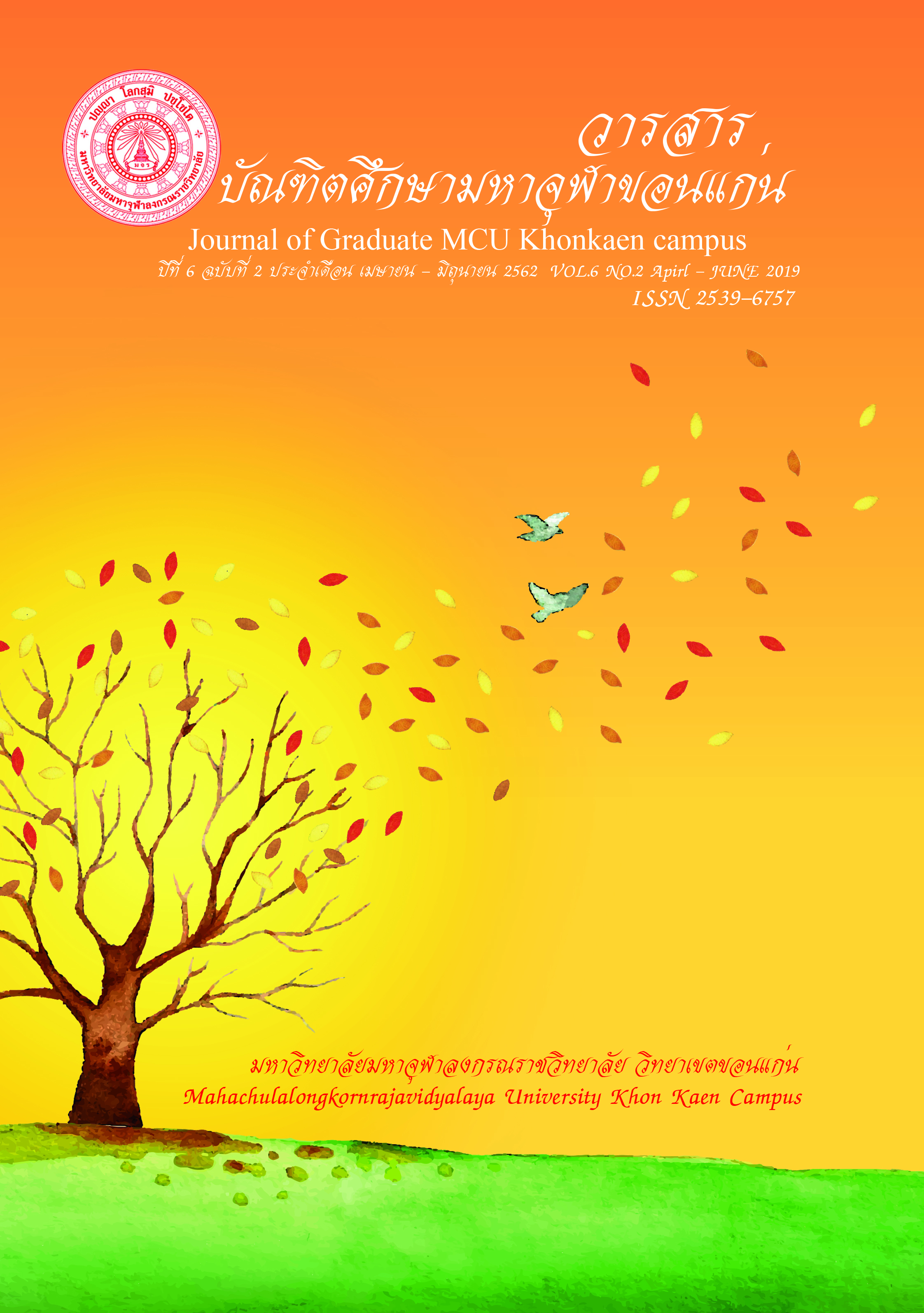Educational Administration in Digital Era According to Suppurisa-Dhamma7 in thePhrapariyattidhammaSchools inKhonkaen Province
Main Article Content
Abstract
The aims of this research were: 1) to study the condition of the educational administration in the digital era according to Sappurisa-Dhamma VII (sappurisa-dhamma; qualities of a good man); 2) to compare the opinions of the administrators and teachers towards the educational administration in the educational institutions in the digital era according the mentioned dhamma; 3) to study the suggestions to develop the aforesaid administration in the Phrapariyatti-dhamma schools, General Education, in KhonKaen. This study employed the mixed methods research. The quantitative research was used to collect the data from 160 samples: the educational administrators and teachers selected based on the method of Krejcie& Morgan by the simple sampling and in this stage, a questionnaire with its reliability value of .97 and a structured interview form were used as the research tools; the statistics used were: Percentage, Mean, Standard Deviation, t-test, f-test (One Way ANOVA). For the qualitative research, 16 of samples selected by the purposive sampling and the data obtained in this stage was interpreted by the descriptive analysis.
The research results were as follows:
1) The overall statistic score of the studied condition of the educational administration in the digital era according to Sappurisa-Dhamma VII of the schools was rated a high level. The scores of the studied aspects were the same. The highest score can be seen in the general administration based on the dhamma, followed by that of the financial administration and personnel administration. The least was seen in that of the academic administration.
2) In both overall and studied aspects, the comparative statistic scores of the samples’ opinions toward the aforesaid administration classified by the sample qualifications: positions, educations and working experiences were differentiated with the statistical significance level of .01.
3) The suggestions to develop the aforesaid administration in the Phrapariyatti-dhamma schools, General Education, in KhonKaen were: 1) the administrators should support the educational institutions to cooperate with other institutions by using the electronic media to develop the academic administration; 2) the administrators should create understanding and knowledge of the educational resources by using the advanced computers;
3) the teachers should manage learning and teaching with the use of the advanced information technology media to help the students understand the lessons; 4) the administrators should support, follow up and evaluate the operation according to the operational standards by using the advanced technology to develop the institutions to the international level.
Article Details
References
th ed.).
New York: Harper & Row.
Division of Buddhist Education. (2014). Practiced-Work Instruction Book of
Dhamma School. (2014). Faculty of General Study 2557 B.E.
Bangkok: National Office of Buddhism.
Krejcie & Morgan. (2011). Cited in BoonchomSrisaad.Introduction to
research. (9
thed). Bangkok: Suweriyasarn.
Ministry of Education. (2010). National Education Act. 2542 B.E. and the
Additional Amendment. Bangkok: S.R. Printing Mass Products.
National office of Buddhism. (2010). Strategic Plan and Developing Plan for
the Education of Dhamma Schools. Online. Retrieved September
30, 2018. from: http://www.onab.go.th
Oranuch Khowpim. (2012). Leadership Accordance with Sappurissa Dhamma
7 of the director of Dhamma Schools in Dhamma Schools,
Faculty of General Study in KhonKaen Province. Master Degree
Thesis. Graduate School: Mahachulalongkornrajavidyalaya
University.
Phrapalad Aphisit Theerapanyo (Lekphinyo). (2017). The Study of Leadership
of Manager Andeducational Personnel Accordance with Sappurissa
Dhamma 7 in Dhamma Schools, Faculty of General Study in
KhonKaen Province. Master Degree Thesis. Graduate School:
Mahachulalongkornrajavidyalaya University.
Suwanna Meidecha. (2012). Work Management Accordance with
Sappirisadhamma 7 of Educational Director, Tadsi District,
Nakhonsavan Province. Master Degree Thesis. Graduate School:
Mahachulalongkornrajavidyalaya University.

